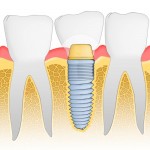
Dental implants are now regularly used for the replacement of single or multiple missing teeth having demonstrated good 10-years survival. As their use increases there is greater interest in understanding a range of reasons that may impact on their survival. Crown to implant ratios is one factor that may have an impact on implant survival or technical failures.
The main aims of this review was to assess the influence of crown-to-implant ratio of single-tooth, non-splinted, implants on biological and technical complications.
Methods
Searches were conducted in the, Medline, Embase and Cochrane Central Register of Controlled Trials (CENTRAL) databases. Retrospective or prospective studies (cohort studies, comparative studies, randomized controlled studies [RCTs]) reporting detailed information on crown-to-implant ratio of single-tooth implant-supported restorations with at least 12 months follow up were considered. The main outcome measures were, implant survival rate, marginal bone level changes, biological complications, and technical complications. After initial screening by a single reviewer two reviewers independently screened studies for inclusion with study quality being assessed using a case series studies tool. A meta-analysis was carried out for implant survival rate and peri-implant bone changes.
Results
- 8 studies (5 prospective, 3 retrospective) involving a total of 767 implant supported crowns.
- The number of implants in the studies ranged from 30-326.
- Follow up periods ranged from 12-140 months.
- The mean crown-to-implant ratio for 6-mm implants varied from 1.48 – 2.14.
- The weighted mean implant loss = 0.487 (95% CI: 0.410–0.563) and
- weighted mean bone loss = 0.076 (95% CI: 0.017–0.134).
- Meta-regression did not detect any significant differences regarding implant loss rate and peri-implant bone loss between the different crown-to-implant ratio groups.
- The meta-analysis showed an implant survival of more than 99% per year and mean peri-implant bone changes of <0.1 mm per year.
- Limited biological and technical complications were reported.
Conclusions
The authors concluded: –
Data reviewed in the current manuscript on crown-to-implant ratio, ranging from 0.86 to 2.14, of single-tooth, non-splinted, implants did not demonstrate a high occurrence of biological or technical complications.
Comments
While a majority of the included studies were prospective the length of follow up for these studies varied from 12-60 months involving between 30-47 implants. The 3 retrospective studies do provide longer follow up times and involve a larger number of implants There is a risk of selection and reporting biases with the retrospective studies. The survival rate of dental implants in the included studies ranges from 90-100% but no information is given related to loss to follow up in any of the included studies. So while the study suggest no adverse effects on biological or technical complications from crown-to-implant ratio ranging from 0.86 to 2.14 the available data is of limited quality and more data from high quality longer-term studies is needed.
Links
Primary Paper
Meijer HJA, Boven C, Delli K, Raghoebar GM. Is there an effect of crown-to-implant ratio on implant treatment outcomes? A systematic review. Clin Oral Implants Res. 2018 Oct;29 Suppl 18:243-252. doi: 10.1111/clr.13338. PubMed PMID: 30306696; PubMed Central PMCID: PMC6221159.
Other references
Dental Elf – Dental Implant Blogs
